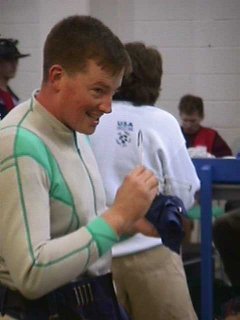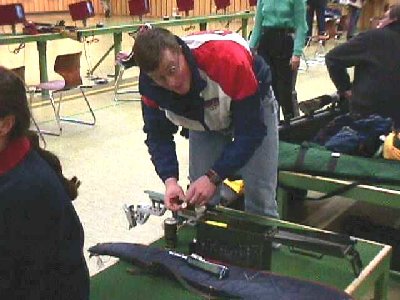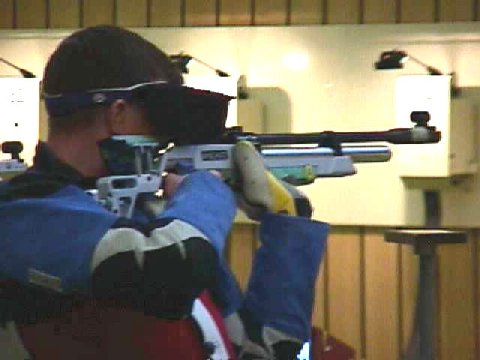INTERVIEW WITH KEN JOHNSON
Ken Johnson, US Rifle Team. USAMU member. Won gold in Air and 3P Rifle at the Pan American Games, and held Air and Free Rifle US records.
How did you start shooting?
Boys Camp back in New Hampshire when I was 9.
Who was your greatest influence in shooting?
Tom Perry, MIT coach. He coached me in high school.
What is your most valuable practice drill?
Dry firing. I have a mason jar almost full of brass. If the shot was perfect, I put the brass in the jar. If I couldn’t say it was perfect, I throw it in the floor.
How do you handle the mental game during the match?
Stay calm, stay focused on what you need to do to perform. No secrets, no magic, just do it right every time.
How do you know when to sit down or back away from it for a little while?
When there is definite change in your hold characteristics, whenever I get back up taking a shot during the match, whenever you notice something’s wrong and what I call the caution light or yellow light you want to put the gun down. It’s a matter of not feeling quite right or you’re running out of breath or your muscles start twitching or something like that, it’s a perfect time to put the gun down during the match and re-focus just relax for a little while and say OK I remember how to shoot a ten. You hold steady, squeeze the trigger just right every time, you just remember all that stuff about how to take a correct shot after you take a break.
A lot of younger folks I see have a little charm or something they put up or special something they wear when they shoot, do you have anything like that?
No, I think maybe as you begin to shoot you maybe are looking for something special to help you perform but as you gain more experience and become more mature you realize that there’s nothing that’s going give you those extra points. There’s no truth in superstition. You could put something up on your points there to take you mind off of shooting for a while when you need to take a break, but don’t use it as a crutch. Don’t use it as your magic bullet.
 Is there anything that you try to think about during the match that’s just kind of of a free floating thing that you can sort of think of it and still keep you concentration, and you know, something you can drift back in to keep your mind off of current affairs?
Is there anything that you try to think about during the match that’s just kind of of a free floating thing that you can sort of think of it and still keep you concentration, and you know, something you can drift back in to keep your mind off of current affairs?
I remember when I was a younger shooter, me and a bunch of people used to always talk about getting a song stuck in our heads. You know, and you can’t get rid of the song, you just shoot along with the song and enjoy it instead of it being like a hindrance to your performance. Just sing the song while your shooting. And once you shoot long enough everything kind of becomes automatic. It’s like most of the time when I load my air rifle I don’t know that I did it or I’ll have to check my rifle to make sure that I loaded because it already happened. It’s just happened so many continuous times that you brain just shuts off to it. Your brain doesn’t know that you loaded it; your body loaded it but your brain doesn’t know, so once that happens, once you’re loading automatically, you’re setting up automatically, you don’t have to think about this stuff. Your mind does tend to go on to other things and every once in a while it’s a song or it’s a something in your imagination you just go with it let it happen.
What do you not think about during a match?
Every time you think about shooting a nine, every time you think OK, I shot nine tens in a row and you think to yourself what happens if I shoot a nine? Whenever you think that you need to put the gun down and re-focus. Just start every thing all over again.
How do you prepare for matches at the beginning of the season January through March compared to the middle of competition season, or say the Olympic tryouts?
Yes, at the beginning of the year the emphasis should be placed on examining techniques that you’re working on to determine whether those techniques work or not, and later in the year you should be not experimenting with new techniques. You should be using the techniques that you found to work every time so later on in the season you should just be working on simple repetition. Just to being more and more comfortable with the techniques that you found to work.
Do you train with weights in the winter months for strength and stability?
I pretty much follow the regular Army PT schedule. I run a couple times a week. I do push ups and sit ups, ride my bike quite a bit. That’s about it but in terms of weights my wife (Nancy Johnson) uses weights but I don’t use them so much.
What one thing do you wish you could have learned earlier in your shooting career?
Testing ammunition. There’s a lot of assumptions. Well, with air rifles it’s not as important because most air rifles are so accurate anyway. But with smallbore shooting if you don’t have a good accurate rifle and good accurate ammunition when you’re going to big matches you’re almost wasting your money if you haven’t done some kind of ammunition testing, and I never did that when I was young. People around me always told me that the ammunition that I was shooting was far more accurate than I was, and now that I have been testing ammunition for seven or eight years I know that that’s not necessarily the case.
Would that have been true when you  were shooting as a junior as well?
were shooting as a junior as well?
Yes. Probably so after the first little while.
What one thing do you think is faulty (I know you work with juniors a lot); what do you see is the biggest problem with juniors having when they’re starting to learn?
They refuse to write things down and they need to keep an accurate diary. That’s it. That is the fault that juniors have . They are so lackadaisical about being methodical in writing things down and so you have to tell them ten times to do it . To make sure their butt plate’s in the correct position, their sling’s OK, but if they had their diary they would know exactly where to put it every time. A diary, and write every time they train.
Gary Anderson said one time that a well-practiced mistake is better than an eternal search for perfection. What would your comments be on that? Take Josef Gonzci’s head position for instance?
Well, I would tend to think that he’s shooting good despite of his head position, but yes, it’s definitely better to be consistent in your methods then float around and try new things every time. When you try new things you should have a specific reason for trying new things and it should be scientifically tested.
By scientifically tested, would you mean something like a Noptel or RIKA HomeTrainer?
Yes, those are good ways.
Are you really religious about when you come into a new shooting hall, checking you front aperture and dialing it into the light? Any comment you have for beginner shooters in that regard?
Check everything out in your sighters and evaluate what happens in different lighting conditions. You can do it on your own home range so that if you know the light is really bright you know what to do with your rear iris and your front aperture, and if it’s really dark you’ll also know what to do. For the most part I’ve heard of people, junior shooters, opening up their rear iris all the way because it’s a dark range, but that’s not necessarily the right thing to do. You tend to keep the rear iris anywhere between a 1.1 and a 1.3, depending on your barrel length, so you should definitely test out once the positions are established and they’re shooting good positions. That’s one thing they should definitely work on is determining what light conditions do to the sight picture.
I see a lot of the people shooting bloop tubes on their air rifles, which to me if you have a good hold, obviously it extends your sight picture and enhances you hold, but if you don’t have a good hold it’s got to make it worse. I see a lot of kids with them, they’ve got to have it because it’s the “IN” thing . What are your comments?
Well neither Jason Parker nor me or Troy Basham shoot with a tube, and the reason is because for one thing if it works, don’t fix it. If it ain’t broken don’t fix it . And we shoot perfectly good scores without a tube and it’s just one more thing that could go wrong. It can get loose or something like that. Yes, some people here in Europe shoot good with tubes, but not all of them. You know if you hang a weight on the end of your barrel, you’re going to change the accuracy of your gun. It may get better or it may get worse, but it won’t be the same. Yes, you can only really increase your sight radius by about I think an inch, which is not much, It’s not like you can increase your sight radius by five inches, you can’t because of the rules. I don’t see much advantage in having a tube.
Any other thoughts?
You have got a good bunch of questions there. I really can’t think of anything else. I would like to harp on the diaries of juniors though, that pisses me off when they don’t write stuff down when you get coaches working with them and you fix one problem and you think you’ve got it fixed and you tell them to write it down and then they come back next week and they’ve got the same problem because they didn’t write anything down; they didn’t write the information down.
